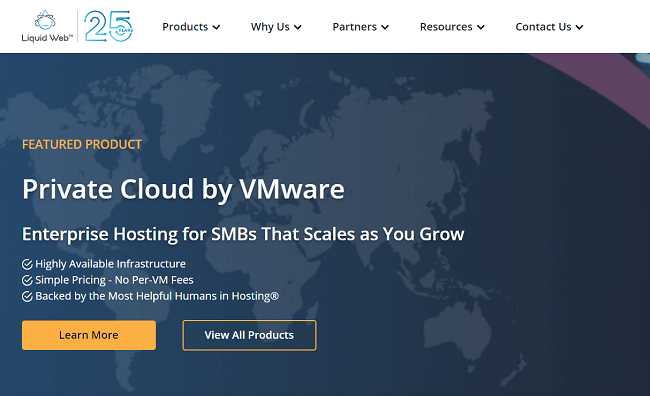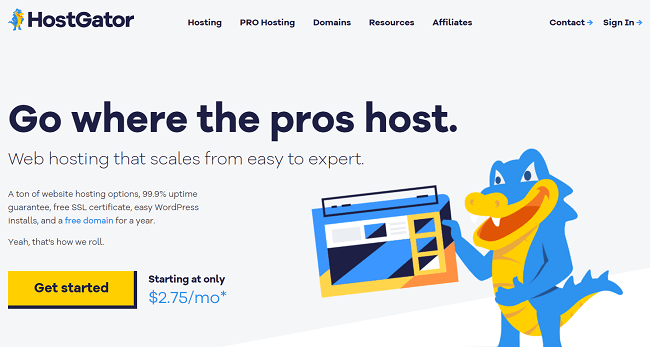9 Best VPS Hosting Providers (2024 Comparison)
Looking for the best VPS hosting providers on the market? You’re in the right place.
Your web host has a huge impact on your site’s speed and performance, so it’s important to make the right choice.
To help you compare your options, we’ve picked out the best VPS hosting providers on the market and reviewed each of them in this post.
Below, we’ll look at each of the leading web hosting service providers’ key features, pros and cons, and pricing, and let you know what each one is best for.
The best VPS hosting providers – summary
First, let’s take a look at some of our top picks:
TL;DR:
- Liquid Web – Best overall (fastest & most reliable).
- Cloudways – Best for scalability.
- DigitalOcean – Best for developers.
- DreamHost – Best managed VPS hosting.
- A2 Hosting – Best unmanaged VPS hosting.
- GreenGeeks – Best eco-friendly hosting provider.
- Hostinger – Cheapest plans.
Now, let’s take a look at each web host in more detail:
#1 – Liquid Web
Liquid Web is our overall favorite VPS hosting provider. It gets top marks across the board, with stellar speed, uptime, security, and support. And it’s fairly reasonably priced too.

There’s a lot to like about Liquid Web. First off, it’s the most reliable web hosting provider we’ve seen, with the best uptime guarantee.
Most web hosts promise 99.9% uptime, but that still leaves them with a margin for error. Even 0.1% downtime can be costly for your business and damage your reputation and revenue.
Liquid Web, on the other hand, is one of the only VPS hosts to offer 100% uptime as part of their SLA (service-level agreement). So you’ll never have to worry about server outages again.
Aside from being one of the most reliable hosts out there, Liquid Web is also one of the fastest. It claims its VPS hosting services are up to 200% faster than competitors like AWS, Rackspace, and DigitalOcean.
And that claim seemed to hold up to scrutiny. Their verified speed tests were conducted by independent third-party analytics firm Cloud Spectator. And in our personal experience, it certainly feels faster.
That matters, because faster hosting service translates to faster page load times. And that in turn leads to better SEO, more organic traffic, and better conversion rates.
In terms of security, Liquid Web is packed with features to keep your site safe including multi-level DDoS protection, off-server backups, proactive monitoring, ServerSecure protection, integrated firewall, and more.
You get root-level access, so you have complete control of the manager server environment. And cPanel, InterWorx, or Plesk provide a neat interface for your admins to work with.
And finally, we can’t fault Liquid Web when it comes to support. Their support team (affectionately dubbed the “Most Helpful Humans in Hosting”) is available 24/7 via phone, chat, and email. So you can always get help when you need it.
Key features
- 2 – 8 vCPU cores
- 4 – 16 GB RAM
- 40 – 200 GB SSD storage
- 10 TB Bandwidth
- Linux and Windows OS are available
- Managed hosting
- InterWork
- 24/7 phone/chat/email support
- DDoS protection
- Cloudflare CDN
- ServerSecure protection
- Root access
- 100% network & power uptime SLAs
Pros
- Best speed and performance
- Super reliable
- Outstanding support
- Good security features
Cons
- Prices increase significantly if you want to pay monthly
- The knowledge base could be better
Pricing
Liquid Web offers several VPS hosting plans starting from $25 per month.
#2 – Cloudways
If you want the benefit of scalability without becoming a developer, Cloudways offers a managed solution that allows you to choose from DigitalOcean, AWS, and other cloud providers.

Now, Cloudways isn’t technically a VPS hosting provider. It’s actually a cloud hosting solution, which is a lot like VPS hosting—but infinitely more scalable.
The difference is that cloud hosting solutions like Cloudways utilize cloud resources to make your website accessible. So rather than relying on a single server, your website is hosted by a network of connected cloud servers, which deliver resources on-demand.
This allows for much greater scalability. As your website traffic increases, you can easily add more resources like storage and bandwidth to keep pace with the demand, so you never experience drops in speed and performance.
For fast-growing startups, this is invaluable.
And that’s not the only benefit. Another great thing about Cloudways is that, unlike single-server hosts, if one cloud server fails, another connected one can take over straight away—so there’s next to no risk of downtime. The multi-server setup also allows for easier data recovery in the event that one server goes down.
Cloudways also offers a built-in advanced cache and Cloudflare CDN to ensure optimal performance, plus useful features like staging environments, backup management, and a free SSL.
Key features
- 3 cloud provider options (DigitalOcean, AWS & Google Cloud)
- Unlimited websites (WordPress, PHP, etc.)
- Pay only for what you use
- Vertical scaling
- Cloudflare add-on
- Free SSL
- Migration
- 24/7 support
- Unlimited application installs
- Firewall
- Real-time monitoring
- Staging environment
- Team management
- Advanced cache optimization
- SSH & SFTP access
Pros
- Incredibly scalable
- Great value for money
- Reliable (very low risk of downtime)
- Excellent performance and speed
Cons
- While the dashboard is easy to navigate, there is a learning curve that may not be ideal for beginners.
- Technically not a VPS provider (cloud-based hosting)
Pricing
Plans start from $11/month. A 3-day trial is available (no credit card required).
#3 – DigitalOcean
DigitalOcean is the best VPS hosting provider for developers. Like Cloudways, it utilizes cloud infrastructure which makes it a more scalable solution than a traditional VPS.

DigitalOcean is aimed at developers and is quite flexible but it has no dashboard as such (cPanel), which does mean it isn’t suitable for all users.
It has 15 globally distributed data centers, great performance, and 99.99% uptime SLA (for Droplets and Storage products).
Their product offerings are also designed for developers so if you’re a casual user/beginner, it can be tough to cut through the jargon. But if you’re an experienced user who knows exactly what you need, it’s perfect.
Droplets are DigitalOcean’s Linux-based, scalable virtual machines. Each Droplet you create is a new server that you can use as part of your cloud-based infrastructure. You can customize your Droplets to meet your business’s specific needs, and scale up CPU, RAM, and Disk as your demand shifts.
Other products include Spaces, Kubernetes, Databases, Functions, App Platform, Load Balancers, and more.
Key features
- 99.99% uptime SLA
- Scalable resources
- Backups
- Cloud firewalls
- Monitoring
- SSD Block Storage
- Snapshots
- Team management
- Spaces Object Storage
- Load Balancers
- Reserved IPs
Pros
- Developer-friendly
- Advanced and flexible infrastructure
- Good performance and uptime
- Affordable versus other cloud providers such as Amazon AWS
Cons
- Built for advanced users (not suitable for beginners)
- No cPanel
- Complicated pricing
Pricing
Pricing is customizable based on usage, and starting prices depend on which cloud solution you choose. Droplets start at $4/month.
#4 – DreamHost
DreamHost is a very popular, low-cost hosting provider. They’re well-known for their Shared & WordPress hosting plans, but their Managed VPS Hosting offering is also excellent.

Unlike DigitalOcean, you don’t have to be a developer to use DreamHost. It’s very much a beginner-friendly hosting provider that’s super easy to work with thanks to the simple but powerful control panel and straightforward, managed hosting packages.
It’s very affordable with plans starting at just $10/month. And all plans include unlimited websites and unlimited traffic/bandwidth, which is awesome as you don’t have to worry about overage fees.
You also get a free SSL certificate and unlimited @domain email addresses regardless of which plan you choose.
The entry-level plan only includes 1GB of RAM, but if you need more, you can scale up in seconds by upgrading your plan from within your VPS control panel.
DreamHost’s VPS plans are fully-managed, so their experts will handle maintenance tasks for you and keep your server running with security patches, updates, etc.
Another thing we like about DreamHost is that it’s a good choice for resellers and agencies as it lets you create an unlimited number of sub-accounts for your clients.
Key features
- Unlimited bandwidth and traffic
- SSDs
- Unlimited domains
- US-based VPS
- Free SSL
- Unlimited email (@yourdomain)
- 24/7 support
- 100% uptime guarantee
Pros
- Affordable
- Beginner-friendly
- Excellent uptime
- Good choice for resellers/agencies
Cons
- No root access (only available on Cloud Servers)
- Low RAM on entry-level plans
Pricing
DreamHost VPS plans start from $10/month
#5 – A2 Hosting
A2 Hosting is another super popular, low-cost hosting provider. They offer a huge range of plans, but in particular, their unmanaged VPS hosting plans offer excellent value for money.

A2Hosting offers both managed and unmanaged hosting packages. Their managed VPS packages seem a little pricey on the surface, as starting prices are over 2x as much as DreamHost. But actually, you get 4x as much RAM, so the value is there.
And all managed VPS plans include an easy cPanel, managed network/hardware, 24/7 Support, security, and free SSL and website migration.
But if you want the most bang for your buck, it’s their unmanaged VPS hosting plans that you’ll want to look at. They start from just $4.99/month and are perfect for experienced users who know what they’re doing and want maximum control over their servers.
On unmanaged plans, you can configure everything to your precise settings and requirements, with full root-level access, command line management, choice of OS, etc.
A2 Hosting also gets top marks for security. And in our speed tests, they had fairly consistent performance too.
Key features
- Managed & unmanaged plans
- 24/7 support
- Root access available
- cPanel (on Managed plans)
- 1 GB – 8 GB RAM
- Money-back guarantee
Pros
- Excellent unmanaged plans
- Lots of control
- Great security
Cons
- Managed hosting plans could be better
Pricing
Unmanaged plans start at $4.99/month. Managed plans start at $23.99/month.
#6 – GreenGeeks
GreenGeeks is the leading eco-friendly web hosting provider. Their USP is their energy-efficient infrastructure, which makes them a good choice for environmentally-conscious users.

In recent years, there’s been a notable shift in consumer awareness of environmental issues. Businesses these days are under huge pressure to reduce their carbon footprint and minimize their negative impact on the environment—and GreenGeeks can help with that.
As the brand name suggests, they’re one of the ‘greenest’ hosting providers on the market, with an infrastructure that’s built to be as energy efficient as possible. They take a maximum-use, no-waste approach to hosting and put 3x as much renewable energy back into the grid than they consume.
Not only that, but they also plant one tree for every hosting account. So by signing up, you’ll be having a positive impact on the environment.
Of course, that’s not the only reason to choose GreenGeeks.
They’re also a very fast and reliable hosting provider thanks to lightning-fast SSD storage arrays & Intel Xeon Processors.
Plans are a little pricier than some other options, but you get a decent amount of RAM, SSD Disk Space, and vCPU. And all plans include free SSL, website transfer, Softaculous license, cPanel, and managed support.
GreenGeek has data centers around the world but mostly concentrated in the US, Canada, and Europe.
Key features
- 300% Green Energy Match
- Tree planting
- Globally distributed data centers
- Free SSL
- Website migration
- Softaculous license
- Managed support
- SSD storage
Pros
- Eco-friendly hosting provider
- Reasonably good performance
- Good uptime
Cons
- Not great value for money
Pricing
Plans start at $39.95 per month (billed monthly).
#7 – Hostinger
Hostinger is the cheapest VPS hosting provider on this list. It has the lowest-priced entry-level plan we’ve found. So if you want to keep costs as low as possible, this is the way to go.

Hostinger has a super straightforward and scalable pricing structure. VPS plans are numbered from 1 to 8. The higher the number, the more RAM, bandwidth, and Disk Space—and the more you’ll pay.
The entry-level plan, VPS 1, starts from just $3.49/month. It doesn’t get cheaper than that, so it’s great for cash-strapped startups who are on a tight budget.
On VPS 1, you only get 1GB of RAM , 20GB of SSD storage, and 1 TB of bandwidth, which is very low. But if you only have a small, low-traffic website with a limited number of pages, it should be sufficient. And if you outgrow your plan limits, you can just upgrade to the next tier.
Despite the low price, Hostinger still offers reasonably fast load times and a 99.9% server uptime guarantee. And you have complete control with full root access.
Key features
- Full root level access
- 99.9% uptime
- Flexible plans
- Security
- Weekly backups
- Snapshot
- Dedicated IP
Pros
- Cheapest possible plans
- Scalable
- Good value for money
Cons
- Low resources on bottom-tier plans
- Support could be better
Pricing
VPS plans start from $3.49 per month.
#8 – Bluehost
Bluehost is one of the oldest and most well-known hosting providers out there. We really like the Bluehost interface and control panel; it’s very easy to use.

Bluehost’s VPS plans are designed to empower developers, designers, and admits to build without limits.
Unlike their shared hosting plans, the VPS plans give you more control with full root access, multi-server management, access control, etc.
You can host unlimited domains and websites, and organize your server environment however you want. All the tools you need to manage your sites and analyze your performance are available in one easy-to-use, clean and simple dashboard.
If you need support, Bluehost’s knowledge base is invaluable. It provides tons of resources that help you to learn about VPS hosting and how to navigate your hosting environment. And if you want to speak to a real person, Bluehost has a helpful support team that’s available 24/7 through live chat, email, and telephone.
Plans range from 2 GB to 8 GB of RAM and 1 TB to 3 TB of bandwidth, depending on what you sign up for. In terms of speed, we found Bluehost’s load times to be mediocre. Not bad, but not great.
Key features
- cPanel
- IP address
- Multi-server management
- Access control
- Root access
- VPS dashboard
- SSD
- Unlimited domains/website
- 24/7 support
Pros
- Easy to use
- Great support & knowledge base
- Unlimited domains and websites
- Nice UI / dashboard
Cons
- Mediocre speed
Pricing
Plans start at $19.99/month
#9 – HostGator
Lastly, we have HostGator. It’s another solid option with a good balance of features and decent performance.

HostGator offers a generous 30-day money-back guarantee on its VPS hosting plans and promises 99.9% uptime.
You get full root access for your choice of CMS or custom code, and advanced functionality like unlimited MySQL databases, SSI, access to raw log files, reseller & subaccounts, weekly backups, SSH access, etc. It also comes with unlimited domains, email addresses, databases, and FTP accounts.
The HostGator Portal Control Panel is nice to work with, and you get a full suite of tools including a script installer, site development tools, templates, and more.
Our biggest gripe with HostGator is the renewal costs. Plans seem to be good value on the surface thanks to the generous introductory offer (75% off) but when it’s time to renew, prices can jump up substantially.
Key features
- 99.9% uptime
- Control panel
- Script installer
- Development tools
- Templates
- Unlimited MySQL
- Reseller accounts
- Root access
- Weekly backups
Pros
- Affordable
- Easy to use
- Good value
- Good performance
Cons
- Renewal costs
- Support could be better
Pricing
Plans start at $23.95/month with the introductory offer.
Frequently asked questions
Here are some FAQs about VPS hosting before we wrap up.
What is VPS hosting?
VPS stands for Virtual Private Server. This type of hosting uses virtualization technology to provide users with their dedicated virtual partition on a server with multiple users.
VPS hosting vs dedicated hosting vs shared hosting
VPS hosting is essentially a middle ground between shared hosting and dedicated hosting.
It gives you more control and better performance than shared hosting, but not quite as much as dedicated hosting plans. And it’s more expensive than shared hosting but significantly cheaper than dedicated hosting plans.
Here’s the difference between each type of hosting in a nutshell:
- Shared hosting: Your website shares the same resources (i.e. disk space, memory, CPU, etc.) with multiple other websites that are on the same server.
- VPS hosting: Your website still shares one physical server with other users. But this time, you get a specified set of resources and your own dedicated virtual partition. So you don’t have to fight for resources and can be sure resources will always be available to you (within your limits) and get more control and more reliable performance.
- Dedicated hosting: Your website has the entire server all to itself. You don’t have to share with anyone else and have complete control and exclusive access to all available resources.
Who should use VPS hosting?
VPS hosting is a good choice for website owners who have medium-level traffic but don’t yet require the resources of a dedicated server (or who don’t have the budget for it).
Managed vs unmanaged VPS hosting
On managed hosting plans, your hosting provider takes care of some of the technical maintenance tasks involved in managing a server/website for you.
That usually includes things like security, updates, backups, CDN configuration, etc.
On unmanaged hosting plans, you take care of it all yourself. The advantage of this is that it’s a little more flexible as you’ll typically have full access to cPanel and control over your VPS configuration and software.
But the flip side is that it requires a high level of technical know-how and obviously, you’ll have to spend more time on maintenance.
What should I look for in a VPS hosting provider?
There are lots of factors to consider when choosing a VPS hosting provider. Here are the most important things to think about:
- Resources: Make sure you choose a plan that offers enough RAM and CPU for your needs
- Storage space: You’ll need to choose a plan that includes enough storage space for all your website files.
- Bandwidth: This refers to how much data can flow between your site, server, and visitors in a given amount of time. It’s usually measured in GB. f you have a lot of traffic, you’ll need to choose a plan that offers enough bandwidth to meet demand.
- Uptime: The last thing you want is to run into costly website downtime because of server outages, so choose a VPS host that offers a strong uptime guarantee (e.g. 99.9%).
- Speed: Website load times are super important. So try to choose a hosting provider with the best performance and fastest site load times.
- Support: Web hosting can be tricky, and things can go wrong from time to time. That’s why it’s important to have access to fast, responsive support around the clock that can help you to fix problems when they arise.
Conclusion
That concludes our roundup of the best VPS hosting providers to power your website or app.
Any of the hosting providers above might be a good fit for your business, but it’s important to weigh up your options carefully and make the right choice the first time around, as migrating to a new host later can be a headache.
If you’re not sure which one to go for, here’s what we’d suggest:
- Liquid Web is the best choice if you just want a good all-rounder that’s fast and reliable. It’s the overall best VPS hosting provider on the market right now, so you can’t go wrong.
- Cloudways is the best choice for fast-growing startups and anyone who needs a scalable solution. It uses cloud-based infrastructure so you can scale up and down on demand.
- DigitalOcean is the best VPS hosting provider for developers. It offers a suite of products designed to meet the needs of developers and gives you maximum control and flexibility. But its complicated UI and lack of cPanel make it unsuitable for beginner users.
We hope you found this helpful. But if you’d prefer to explore different types of hosting, check out these articles:
Good luck!
Disclosure: If you buy through links on our site, we may make a commission. This helps to support the running of Startup Bonsai.
